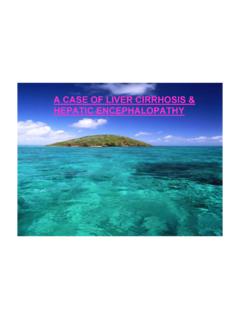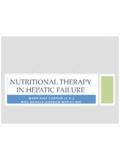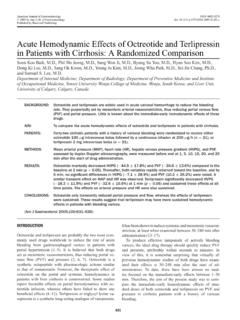Transcription of Nutrition in Liver Disease Guidance: Decompensated Cirrhosis
1 Nutrition guidance: Decompensated Cirrhosis Guidance for GPs and Hospital Specialists Key Advice Protein calorie deficiency and malnutrition is almost universal Aim to meet energy and protein requirements Advise regular meals and snacks Advise a late evening 50g carbohydrate snack Nutritional supplements are often needed - try milk based ones first Calcium and vitamin D supplementation is advised for bone health Thiamine and vitamin B supplements are advised for patients with a history of hazardous or dependent drinking Meeting nutritional needs can be complex and referral to a dietician is often appropriate Decompensated Liver Disease The term Decompensated Cirrhosis refers to when the cirrhotic Liver is showing signs of failure either biochemically eg with a dropping albumin and rising bilirubin or clinically eg with the previous and/or ascites or
2 Encephalopathy. Patients with Decompensated Liver Disease have a reported incidence of protein calorie malnutrition of up to 90 % which is irrespective of whether the Disease is cholestatic or non-cholestatic in nature. Almost 100% of Liver transplant candidates are malnourished. Protein calorie malnutrition (severe protein deficiency at this stage, and inadequate energy intake) has a significant impact on morbidity and mortality, higher rates of encephalopathy, infection and variceal bleeding. Patients with Decompensated Liver Disease have significantly higher energy and protein requirements and impaired intake due to altered metabolism, anorexia of Disease and inappropriate dietary restrictions. Nutrition in Liver Disease Guidance: Decompensated Cirrhosis Nutrition guidance: Decompensated Cirrhosis Meet energy and protein requirements Patients should be encouraged to eat foods which are calorie dense and contain protein.
3 Foods can be enriched by adding sugar (for non- diabetic patients), extra fat, jam, cream, cheese etc. Restriction of protein intake due to encephalopathy is not advised due to the risk of further protein calorie malnutrition and subsequent deterioration of their encephalopathy. Patients should be advised to eat regularly throughout the day and space out the protein portions so that there is not a large protein load for the Liver to breakdown at any one time. Fat restriction in patients with jaundice is only indicated if they have symptoms of steatorrhoea. Referral for specialist Dietetic advice is indicated due to the risk of malnutrition from over restricting a patient s diet leading to deterioration in nutritional status. Fat to tolerance is usually advised, continuing to meet energy and protein requirements and consideration needs to be given to prescription of fat soluble vitamins.
4 For symptoms of ascites a no added salt diet is advised (80-100 mmol Na) equivalent to - of salt per day. However this should be taken in the context of their dietary intake as further restriction may lead to a reduced food intake and further malnutrition. They may only need to be advised to try avoiding some tinned and processed foods which are used on a daily basis but how they replace these needs to be discussed. Referral to a Dietitian may be appropriate. Regular meals and snacks Cirrhotic patients develop starvation type metabolism after fasting earlier than usual as a result of decreased hepatic glycogen stores. Advice should be given to eat every 2-3 hours during the day with small regular meals and snacks which include carbohydrate and protein. Patients struggling with early satiety will often be able to manage more food intake as a result of this pattern and they are less likely to move from the fed to fasted state where the body uses alternative sources of energy from muscle mass.
5 Late evening 50g carbohydrate snack Studies have shown that providing a 50g carbohydrate snack to patients with Liver Disease results in improved nitrogen balance, improved plasma glucose levels and reduces fasting periods overnight. Examples of 50g carbohydrate snacks are: 300mls milk and 3 plain or choc biscuits 5 plain or chocolate biscuits 2 thick slices of toast and jam Nutrition guidance: Decompensated Cirrhosis Breakfast cereal with milk and banana 1 slices plain or fruit cake 1 bottle juice based, kcal/ml supplement 1 bottle milk based, kcal/ml supplement Nutritional supplements These are very useful for patients who have tried all the above advice first and cannot maintain their nutritional status. Milk based supplements tend to provide higher protein contents and should be tried first. Many patients do not like certain flavours and should be encouraged to try a range.
6 They are best served chilled and should be sipped slowly between meals in order to prevent them feeling too full. Optimise diabetes medication in order to allow supplements to be included in order to meet requirements instead of reducing them to control blood glucose levels. Companies have recipes for the supplements to improve compliance available on their websites: Patients who are not meeting their requirements by all the above suggestions should have an urgent referral for further Dietetic review. The British Liver Trust have some excellent patient information leaflets Vitamin supplementation and bone health All patients with Decompensated Cirrhosis should be prescribed calcium and vitamin D supplements. All patients who have a history of hazardous or dependent drinking should be considered for thiamine and vitamin B supplements.
7 There is more information on this in the leaflet on compensated Cirrhosis . Further reading Plauth M, Cabre E, Riggio O et al (2006) ESPEN Guidelines on Enteral Nutrition : Liver Disease . Clin Nutr 25:285-294 Chang WK (1997) Effects of extra-carbohydrate supplementation in the late evening on energy expenditure and substrate oxidation in patients with Liver Cirrhosis . JPEN 21:96-99 Nutrition guidance: Decompensated Cirrhosis Saunders J, Brian A, Wright M et al (2010) Malnutrition and Nutrition support in patients with Liver Disease . Frontline Gastroenterology 1:105-111 Henkel AS and Buchman AL (2006) Nutritional support in chronic Liver Disease . Nat Clin Pract Gastroenterol Hepatol 3(4):202-209 Guideline provenance This information sheet has been written by the specialist Liver dieticians at St James s University Hospital as part of the WEYHN Network Development Project.
8 The nutritional guidance contained in this sheet has been reviewed by consultant hepatologists in Leeds, Bradford and Hull and sent for comments to a GP reference group in April 2011 prior to final release for WEYHN use. Final version September 2011, Review date September 2013






